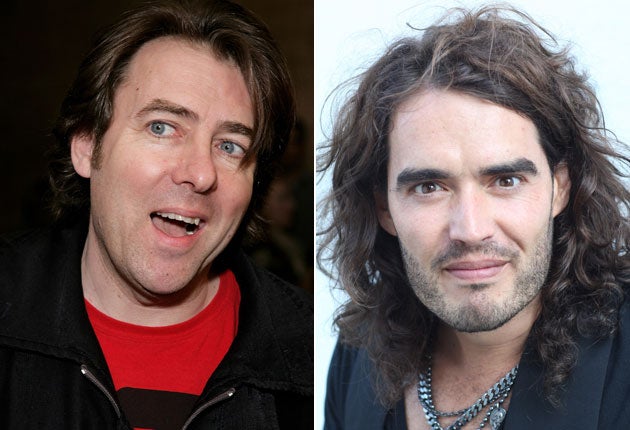Ross and Brand prank "a serious lapse"

Your support helps us to tell the story
From reproductive rights to climate change to Big Tech, The Independent is on the ground when the story is developing. Whether it's investigating the financials of Elon Musk's pro-Trump PAC or producing our latest documentary, 'The A Word', which shines a light on the American women fighting for reproductive rights, we know how important it is to parse out the facts from the messaging.
At such a critical moment in US history, we need reporters on the ground. Your donation allows us to keep sending journalists to speak to both sides of the story.
The Independent is trusted by Americans across the entire political spectrum. And unlike many other quality news outlets, we choose not to lock Americans out of our reporting and analysis with paywalls. We believe quality journalism should be available to everyone, paid for by those who can afford it.
Your support makes all the difference.Lewd phone messages from Jonathan Ross and Russell Brand were a "very serious editorial lapse", the BBC's director-general said today.
BBC chairman Sir Michael Lyons said the corporation had "crossed a boundary" by broadcasting the messages left on actor Andrew Sachs's answerphone on Brand's Radio 2 show.
Facing questions by MPs in a Culture, Media and Sport Committee hearing at the House of Commons, director-general Mark Thompson said: "I am very aware that this was a very serious editorial lapse.
"There were errors in judgment."
Sir Michael and Mr Thompson defended the corporations actions in the aftermath of the scandal.
When criticised for "lamentable slowness", Sir Michael replied: "There was no lack of speed. This is something I do not accept.
"I refute and reject any allegations there were more actions the trust should have taken.
"The trust is doing its job of holding the executive to account."
The grilling was the second session held by the Culture, Media and Sport Committee in its ongoing inquiry into the commercial operations of the BBC.
The terms of reference for the inquiry, published in July, include the benefits, opportunities and risks for the BBC undertaking a range of commercial activities in the UK and abroad.
They also include the future of BBC Worldwide and other BBC commercial subsidiaries and how the money returned to the BBC by its commercial operations is invested.
Culture Secretary Andy Burnham previously said the calls to Sachs were a "serious lapse of broadcasting standards" and the BBC management was "too slow" in recognising the seriousness of the situation.
Radio 2 boss Lesley Douglas also quit on October 30 and that was followed by the resignation of David Barber, the Radio 2 head of specialist music and compliance.
It is thought Barber's job would have involved checking that content complied with BBC guidelines.
The BBC Trust will discuss the furore, which saw Brand quit and Ross suspended, when it meets later this week.
It has requested a final, written report on the matter from the director-general.
Earlier this month, broadcasting watchdog Ofcom criticised Radio 1's Scott Mills show, which airs at a time when children are listening.
During the feature the sounds of the beginning and end of the words remained audible, giving the false impression that the bleep was masking a swear word.
The pair were criticised for failing to fire Ross and Brand for "gross misconduct".
Sir Michael said: "Before you bandy around words like gross misconduct, the BBC has a duty of care.
"The BBC looks at the evidence before making its decisions."
He added: "I think that's the sign of a healthy organisation."
Mr Thompson said the BBC had made improvements over the past five years.
He added: "You cannot expect that sometimes we will not get it wrong. This is a very uncharacteristic."
He added: "It is not typical of the BBC and it is not how our compliance works."
Responding to accusations of "systematic failures", Sir Michael admitted there "were lessons to be learned".
But he added: "It is in the nature of the BBC that it takes risks."
Mr Thompson denied claims that Ross was paid too much.
When asked whether he was worth £6 million a year, he said: "I think, if the BBC has to have top talent, you have to accept that. Even when you grow your own talent, people are on the phone."
He also defended the corporation's commercial arm, BBC Worldwide.
He said: "BBC Worldwide has repeatedly been voted the distributor of choice by the industry."
He added: "The BBC has been able to make programmes it would not have been able to do without BBC Worldwide."
Mr Thompson admitted the BBC lapsed in its duty of care to Mr Sachs's granddaughter, Georgina Baillie.
He said: "This is an example of a really serious editorial lapse which is not close to a boundary where you can debate it.
"It is absolutely well on the wrong side of the line in terms of invasion of privacy and in terms of a lapse in duty of care to some of the individuals - Mr Sachs's granddaughter being at the centre of that.
"I would say that it was entirely appropriate that the rest of the media should point to that."
When asked about his actions in the aftermath of the incident, he said: "Do I think they were disproportionate? No I do not.
"Senior management knew about this programme on Sunday the 26th of October - by the following Thursday we had been able to make an interim report to the trust and make pretty strong recommendations in terms of proportionate actions."
Join our commenting forum
Join thought-provoking conversations, follow other Independent readers and see their replies
Comments